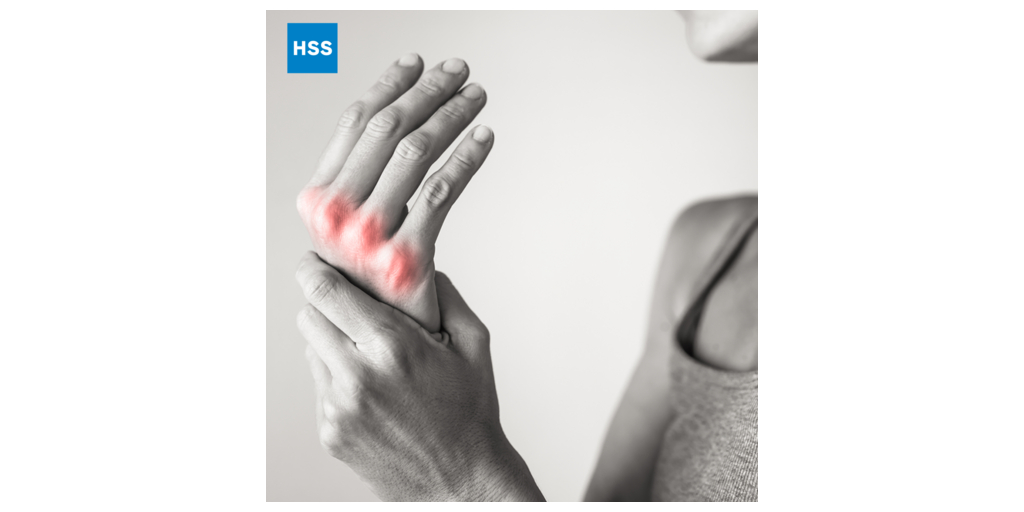BARCELONA, Spain–(BUSINESS WIRE)–Hospital for Special Surgery (HSS) presented new findings at the European Alliance of Associations for Rheumatology (EULAR) Annual Meeting that could help pave the way for more personalized treatment for people with rheumatoid arthritis (RA) by analyzing the cellular composition of synovial fluid inside their joints.
RA is a chronic disease characterized by inflammation in the synovium, the tissue that covers the inner surface of the joint cavity. Although usually accompanied by joint pain, swelling and deterioration, the level of inflammation varies from patient to patient, potentially requiring customized treatment plans. “What is surprising to us is that there are some patients who have clinical remission, yet continue to experience pain and show radiographic progression of the disease with high levels of synovial inflammation, while others have high disease activity with many swollen and tender joints and little inflammation in the synovial tissue” said Susan M. Goodman, MD, rheumatologist at HSS and principal investigator of the study. She explained that even when standard tests suggest the disease is under control, the joint fluid can still show high levels of inflammation. “By analyzing synovial fluid characteristics, we expected it might give us some insight into the disparity between disease progression and apparent remission,” she added.
The team analyzed samples from 64 patients with RA, 90.6% of whom were women, and with a median age of 65.3 ±11.7 years. The physicians collected synovial fluid samples to analyze and compare with the synovial tissue biopsy counterpart, which defines the inflammatory profile of the disease.
Dr. Goodman and the team measured the total white blood cell count, as well as the percentage of neutrophils, lymphocytes and monocytes in each synovial fluid sample. They then compared those findings to two additional key pieces of clinical information: the patient’s disease activity (such as joint swelling, pain, etc.) and the level of inflammation seen in the tissue.
Their analysis revealed that the total white blood cell count in the synovial fluid did not correlate with disease activity, however, the counting of individual cell types gave insights into tissue inflammation. As such, a higher percentage of neutrophils was associated with increased inflammation in the tissue, while a higher percentage of monocytes was associated with lower inflammation in the tissue.
Because the white blood cell counts in synovial fluid provided distinct and different information from standard disease activity measures and correlated well with tissue inflammation, the team believes it could help guide the selection of personalized anti-inflammatory therapies more efficiently.
“Synovial fluid extraction is already a routine part of care, but until now, it has never been used to analyze disease state in this way,” explained Dr. Goodman. In other words, the approach could be adopted without placing additional burden on healthcare providers.
«It’s important that we’re gaining new methods of investigating patients with RA,” Dr. Goodman added, “since choosing the appropriate therapy and choosing it in an efficient way is clearly the best way to achieve the best outcomes.”
According to Dr. Goodman, the next phase of this study, led by HSS rheumatologists Melanie H. Smith, MD, MPH, and Dana Orange, MD, MS, will look at both the proteomics and genetics of the cells within the fluid with more molecular and immunologic techniques, with the goal of finding even more clinically relevant and important information.
Poster details
Title: Can synovial fluid features be used to predict synovial tissue pathotype?
Authors: Susan M. Goodman, Michael Parides, Solana Cushing, Daniel Ramirez, Edward DiCarlo, Rebecca B. Blank, Laura Donlin, Anna Helena Jonsson, Amit Lakhanpal, Bella Mehta, Dana Orange, Melanie Smith.
Abstract n°: 2057
Presentation: June 12th, 2025. 2:45 PM CEST
About HSS
HSS is the world’s leading academic medical center focused on musculoskeletal health. At its core is Hospital for Special Surgery, nationally ranked No. 1 in orthopedics (for the 15th consecutive year), No. 3 in rheumatology by U.S. News & World Report (2024-2025), and the best pediatric orthopedic hospital in NY, NJ and CT by U.S. News & World Report “Best Children’s Hospitals” list (2024-2025). In a survey of medical professionals in more than 20 countries by Newsweek, HSS is ranked world #1 in orthopedics for a fifth consecutive year (2025). Founded in 1863, the Hospital has the lowest readmission rates in the nation for orthopedics, and among the lowest infection and complication rates. HSS was the first in New York State to receive Magnet Recognition for Excellence in Nursing Service from the American Nurses Credentialing Center five consecutive times. An affiliate of Weill Cornell Medical College, HSS has a main campus in New York City and facilities in New Jersey, Connecticut and in the Long Island and Westchester County regions of New York State, as well as in Florida. In addition to patient care, HSS leads the field in research, innovation and education. The HSS Research Institute comprises 20 laboratories and 300 staff members focused on leading the advancement of musculoskeletal health through prevention of degeneration, tissue repair and tissue regeneration. In addition, more than 200 HSS clinical investigators are working to improve patient outcomes through better ways to prevent, diagnose, and treat orthopedic, rheumatic and musculoskeletal diseases. The HSS Innovation Institute works to realize the potential of new drugs, therapeutics and devices. The HSS Education Institute is a trusted leader in advancing musculoskeletal knowledge and research for physicians, nurses, allied health professionals, academic trainees, and consumers in more than 165 countries. The institution is collaborating with medical centers and other organizations to advance the quality and value of musculoskeletal care and to make world-class HSS care more widely accessible nationally and internationally. www.hss.edu.
Contacts
Tracy Hickenbottom/Rachael Rennich
212-606-1197
mediarelations@hss.edu





